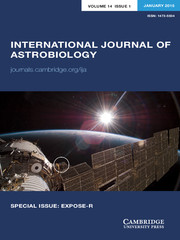Article contents
The preservation of fluid inclusions in diverse surface precipitates: the potential for sampling palaeo-water from surface deposits on Mars
Published online by Cambridge University Press: 05 August 2004
Abstract
A wide range of surface deposits have been suggested as targets for the search for evidence of life on the surface of Mars. We show that duricrusts, biogenic lacustrine precipitates, hydrothermal and chemosynthetic precipitates, speleothems, travertines and evaporites all contain low-temperature fluid inclusions which represent surface/very-near-surface fluids. These fluid inclusions have good preservation potential. The recording of abundant inclusions in sulphate crusts is particularly important as they may be widespread on Mars. The inclusion fluids represent the surface waters from which the precipitates were deposited, so they may contain biomolecules from any ambient life in the surface environment. As problems of analytical sensitivity and contamination are overcome, such surface deposits have the potential to yield samples of Martian palaeo-water and any entrained biomolecules.
- Type
- Research Article
- Information
- Copyright
- 2004 Cambridge University Press
- 7
- Cited by


